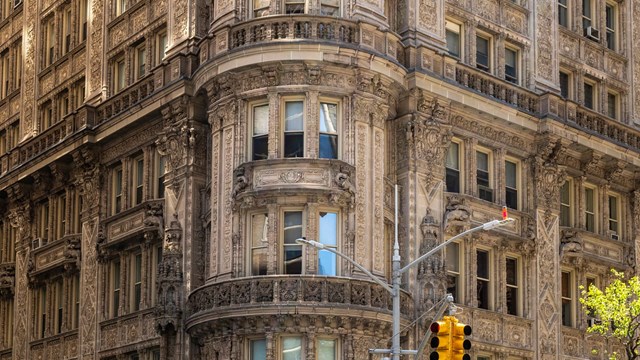Major exterior repairs and construction projects are serious business, otherwise they wouldn't be called "major." Too often, though, people tend to hire experienced architects and professional contractors only when they absolutely need to, and then often ask only one question: What's this going to cost?
But as board members and managing agents, you should be thinking about more than that when hiring professionals for major jobs in your building. And there are other questions that can help prevent problems down the road if answered regularly—not just when a big project comes up.
So here are just a few questions the experts think you should be asking them—along with their answers.
What is Our Local Law 11 Status?
Since 1980, New York City law has required that most buildings six stories or higher have their façades inspected regularly by an engineer or contractor. Under that law, façades could be exempt if they stood back at least 25 feet from the street. The reason for the law was to protect pedestrians from falling pieces of building.
In the late 1990s, after a piece of a façade that
"Before, there was the possibility of a building having a non-compliance situation identified," says Paul Millman of SUPERSTRUCTURES Engineers + Architects. "And as long as it wasn't unsafe, landlords could let those situations [remain unchanged] so long as every five years, a professional came back and said, "˜It still looks safe.' In theory, they
Local Law 11 of 1998 does not allow those repairs to be delayed past the current cycle, and anything deemed "safe-for-repair and maintenance" must be repaired by February 21, 2007.
"Right now is when that particular provision is coming home to roost," Millman says. "We're into the sixth cycle under Local Law 10 or 11, a cycle being every five years or so. The last cycle was the first one done under the auspices of Local Law 11, so anything judged "˜safe with repair and maintenance' last time—which meant it could be a minor crack, nothing earth shattering—would need to be repaired, or the building could face violations.
"Even if it hasn't changed a bit from the way it looked five years ago, if it was catalogued as a safe-with-repair-and-maintenance, the building has to repair before filing the next report," says Millman. "And the deadline for filing the report is February 21, 2007."
This means building managers have to know what is required of them and that have to start getting those repairs done.
How Does Local Law 11 Affect Us?
Even if your building is shorter than seven stories, Local Law 11 still has an impact on you. Because of the new inspection and repair policies, if your building requires any sort of repair, you should get it done now, because as deadlines approach, engineers and contractors are going to be hard to find—and they're going to be expensive.
"Even if a building is not six stories, you should be aware that as more and more of these buildings start doing repair programs to meet the deadline, the cost in contractors is going to rise," says William O'Brien of Falcon Consulting Engineering PLLC. "So if you're a five-story building thinking about a repair plan, now is the time to do it."
"As people wake up to this, it's going to be tougher and tougher to get an engineer and contractors to work on these repairs," Millman says.
Are You Licensed and Insured?
This is one question that one construction owner feels is imperative to ask.
"It is one of most ridiculous oversights that a human being can commit in this business," says Wayne Bellet of Bellet Construction Co., Inc. "You should ask, "˜Are you, Mr.-Contractor-who-is-going-to-be-hanging-off-the-side-of-my-30-story co-op, properly insured, and how can I know that to be true?"
After seeing the license, you can call 311 and confirm the company's four-digit rigger's license number. The city can confirm the number and that it matches with the company's name. Bellet says that in 25 years, he has never been asked for his license number and that too often, unlicensed companies are hired for jobs without the building management knowing.
But your board and building management
How Do We Prioritize Our Concerns?
Many times, buildings deal with exterior problems only when they're actively leaking or when they start to look unsightly. But that crack that doesn't look all that bad
"You can have something and say, "˜It doesn¹t leak—I think it's just that the coating is falling off," says O'Brien, "But you know what? Maybe the crack extends all the way into the structural steel that's damaged underneath. An engineer can look at it and determine if it might be something serious."
Can New Technologies Work for Us?
"In the last few years," O'Brien adds, "there are have been a fair number of technological changes in roofing design. Products have come out that have very long warranties and can be applied over difficult surfaces. It may not be a bad idea to evaluate what can be done with an existing roof that might have had more limitations in the past."
For example, O'Brien mentions new roofing materials that are sprayed or rolled on, but if you want to think big for your building, you may want to consider "greening" your roof.
"If you're open to spending a little more money, your building can have more of a garden-type roof," O'Brien says. "This is going to be more applicable if it's a concrete-roofed building, but there are companies now that install green roofs on any kind of roof surface, and it results in great vegetation."
O'Brien says his firm can advise building managers as to whether or not their roof can sustain greening, and put them in touch with companies that install them.
"You may need some structural modifications, and it can be expensive, but you may have a potential asset up there that people would really love," O'Brien says. "Even if it's just a bed of low-lying vegetation or grass with some benches, it can result in a nice setting."
How Long Have You Been in Business?
While being the client of an up-and-coming contractor or firm can sometimes lead to breaks on pricing, there are some instances where an experienced hand is beneficial. At the very least, you should ask how long each company you're talking to has been around in order to make an informed decision about their expertise and reputation.
"Let's say you're putting down a 20-year roof system," says Bellet. "These days, I can give you a cutting-edge, 30-year roofing system—even though the 20-year warranty is standard now. Twenty years is a long time, and it's kind of dumb to hire a firm that hasn't been in business for at least that long—what are the chances that a new company will be around to cover the [warranty]?"
Bellet says that people often mistakenly rely on the manufacturer to cover the warranty.
"What they're thinking is, "˜The contractor can go, but the roof manufacturer will be around.' And that's true; most are like Firestone and Goodyear. They're companies and corporations that have been around a long time and probably will sustain through the 20 years, but the contractor is the first line of defense to fix it.
"And besides," says Bellet, "longevity implies that you've been doing something right all these years."
Anthony Stoeckert is a freelance writer and regular contributor to The Cooperator.







Leave a Comment